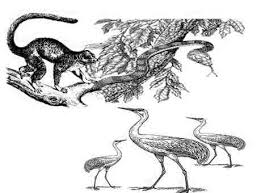The Foolish Crane
There was a banyan tree in the middle of a certain forest. Once a flock of cranes lived on the tree. There was a black cobra lived in a hole in the same tree. The snake spent its life-time happily by eating the eggs of the cranes and even the newly born chicken of the same. On watching act of the cobra, a crane worried very much due to the loss of chicken and shed tears on the bank of a lake facing downwards. On seeing the pathetic condition of the crane, a crab came and asked thus: oh! My dear uncle! Why are you crying today? Then the crane replied thus: Oh! My dear! What shall I do? I am unfortunate. The young chicken of mine and my relatives are being swallowed by the black cobra which resides in the hole of the same tree. So I became grief-stricken. Please tell me an idea by which I can kill it. On hearing this, that crab before responding started to think thus: ‘Naturally these cranes are the real enemies of the race of crabs like me. Anyway, I will give an advice which is really a lie, by which all the cranes become perished. It is well known that,
“Navaneetha samaam vaaneem kruthvaa chittham thu nirdhayam l
Thathaa prabodhyathe sathrus saanvayo mriyathe yathaa ll”
One should speak pleasant words to his enemies without having the kindness towards them. Then only our enemies will follow our advice by which he can be destructed with his race.” Then the crab said aloud, Oh! Uncle! You may scatter the pieces of fish from the burrow of mongoose up to the cobra’s hole. If you do so, the mongoose will follow the trail and will kill the cobra immediately. The foolish crane accepted the advice of the crab and responded same. Then the mongoose followed the bits of scattered fish and killed the evil cobra. But also it ate all the flock of crane one by one gradually.
Moral of the story:
“Upaayam chinthayeth praajnas thathaa apayam cha chinthayeth l
Pasyatho bakamoorkhasya nakulena hathaah bakaah ll”
He is wise one who thinks about a plan whether it is endowed with merits and demerits. One should not be like a foolish crane which received the advice from a crab and responded without thinking well and perished by the mongoose along with its race.
(This story is taken from the titled Mithrabhedah- the 1st volume of the book PanchaThanthram which has five volumes viz., MitraBedhah, MitraLaabhah, Kaakolookeeyam, Labdhapranaasam and AparikshitaKaarakam written by Vishnu Sarma was an Indian scholar. The exact period of the composition of the Panchatantra is uncertain, and estimates vary from 1200 BCE to 300 CE.
This is a part of Blogchatter's write a page a day campaign.
https://www.theblogchatter.com/campaign-registrations/write-a-page-a-day





No comments:
Post a Comment